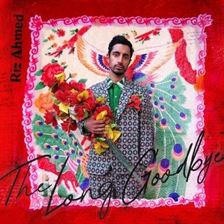In a time of heightened political tensions, Riz Ahmed makes his rapping return with his Pakistani pride, holding roses in hand and a powerful breakup story to tell. But this is not just any breakup. His third studio album, “The Long Goodbye,” tells of one between him and Great Britain.
Ahmed, who also performs under the name Riz MC, is part of the rap duo, The Swet Shop Boys. He is known for displaying his heartfelt pride for his country through emotional poetry transformed into rap. Aside from his Riz MC alter ego, Ahmed opens the door for Pakistanis and people of color to express their anger about racism in Britain by using his birth name, Riz Ahmed.
Though he might be more known for his roles in blockbuster films such as “Star Wars” and “Venom,” Ahmed proves his talents through his penmanship written through songs featured on his latest album, “The Long Goodbye.” This album follows his previous works of “Cashmere” and “Englistan.”
Starting the story with a powerful and emotionally filled song, “The Breakup (Shiwa),” Ahmed comes to the realization that the relationship between him and his home country of Britain has always been toxic and takes this time to voice how he truly feels. Ahmed proves that Pakistanis still have a voice through the oppression they have faced and continue to face.
With culturally and historically intricate meanings, he displays a beautifully painted canvas filled with pain, redemption and newfound independence that runs throughout the album’s progression.
When listening to the album track by track, Ahmed features short voicemails from his close friends such as Hasan Minhaj and Yara Shahidi. In the audio clips, they offer him advice on what to do during the confusing time in his life.
Minhaj took a comedic approach and called to let Ahmed know of a sighting of his ex-girlfriend and an illegal copy of “Rush Hour 2” that Ahmed borrowed years back. On the other hand, Shahidi took a more spiritual approach, asking him to reflect back on his identity and who he was before Britain and the split.
While his friends encourage him to see the light at the end of the tunnel, he stands tall with “Fast Lava,” proving his presence with lyrics describing the fear and panic that runs through the population when more British Pakistanis establish themselves professionally and financially. With his pride on his sleeve, Ahmed physically plants his feet down into the roots of Britain, making him part of it’s DNA as Pakistanis always have been.
Closing the album with “Karma,” Ahmed comes to the awakening and understanding of the oppression felt from Great Britain and how life has changed since originally feeling hate weighing down on his shoulders.
In “Karma/Nirvana, Kurta Cobain,” Ahmed references Kurt Cobain by rapping, saying that his accomplishments of being on huge billboards were for cultural representation. Essentially, he is implying that he is big enough on Cobain’s level, where racists are causing an uproar over his strong impact in his community.
In the short film released simultaneously with the album, Ahmed displays the vision for his work. It features a traditional Pakistani household enjoying the day as he plays with his younger relative, while the girls upstairs curl their hair. Everything seems calm until Ahmed looks out the window to find British police raiding another Pakistani home across the street which ensues panic.
With the album having political meanings intertwined within its context, Ahmed has also been gaining momentum in British Parliament. Naz Shah, leader of the British Labour Party, spoke and recited to Parliament the concerns of rising xenophobia in Britain and was greeted with shouts.
“The Long Goodbye” provides Pakistanis with a shield of representation and strength that they can all wear proudly.



